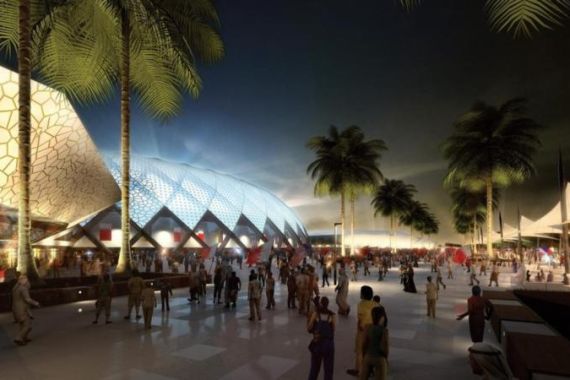Qatar can host World Cup in summer or winter
The debate rumbles on as to what time of year 2022 World Cup hosts Qatar will hold football’s biggest competition.

Qatar would be willing to host the 2022 World Cup in the European winter despite winning the bid with a controversial summer proposal, local organisers said on Friday.
“Concerning the timing of the 2022 FIFA World Cup, we have always reiterated that we bid on the parameters that we would host in the summer of 2022,” the Qatar 2022 supreme committee said in a statement.
Keep reading
list of 4 itemsMoroccan club ‘wins’ cup tie 3-0 after Algerian hosts confiscate kits
‘You lost the league’: Derby loss spoils Klopp’s perfect Liverpool sendoff
Struggling Everton dent Liverpool title hopes in pivotal Merseyside derby
“Various figures from the world of football have raised preferences for hosting in the winter. We are ready to host the World Cup in summer or winter. Our planning isn’t affected either way…”
FIFA president Sepp Blatter said on Thursday that any request to change the timing of the event to cooler months would have to come from Qatar, where temperatures can exceed 40 degrees celsius in June and July.
“If there is a move, it must come from Qatar,” he said, adding that FIA would otherwise stand by the shock decision they made in December 2010 to award soccer’s biggest event to the tiny Gulf state.
However the world soccer body’s secretary general Jerome Valcke said this month that the tournament could be rescheduled if medical evidence showed that the intense heat could harm players.
UEFA president Michel Platini, a former France international, is a staunch opponent of a summer World Cup in Qatar and has repeatedly called for a switch.
Legal challenge?
Historically, the World Cup has always been held in June and July and any change could lead to a major scheduling headache with the major European leagues normally playing through the winter.
The qualifying programme for the World Cup would have to start and finish six months earlier – it usually ends in the November of the year preceding the finals – and that would have an impact on soccer in all six of FIFA’s confederations.
It would also affect the 2022 Winter Olympics and many other events.
Qatar’s right to stage the 2022 World Cup if the event is moved to the winter months would also be open to a legal challenge.
The vanquished contenders – the United States, Australia, Japan and South Korea – have let it be known unofficially in FIFA circles that they would consider such action.
|
“Our commitment to this is grounded in the legacy it will offer for Qatar and countries with similar climates. It will enable sport to be played 12 months of the year” Qatar 2022 supreme committee statement |
Any legal challenge would have to be done through FIFA and not a court of law, because FIFA owns the World Cup and its own statutes govern when it should be played. At the moment the rule states that the World Cup must be staged in June and/or July.
FIFA would also have to decide which of its bodies could rule on the issue.
Until last year, the executive committee decided on the host nation, but that has been rescinded and now the Congress of 206 member nations must decide the hosts for future World Cups.
Organisers plan to host the tournament in air-conditioned stadiums which will be dismantled after the competition and shipped to developing nations.
Friday’s statement said Qatar had committed “considerable resources” during the bidding process to proving that the cooling technology would work in open-air stadiums, training grounds and fan zones and they would press ahead with developing the systems regardless.
“Our commitment to this is grounded in the legacy it will offer for Qatar and countries with similar climates. It will enable sport to be played 12 months of the year,” it said.
“The application of this technology is not limited to stadiums or sports venues. It can be applied in public spaces, so outdoor life can be enjoyed all year round, regardless of climate.”
Qatar 2022 said the technology, powered by renewable energy, had been in use at the Al Sadd stadium since 2008.
One new stadium will break ground this year with five more in the planning stages.